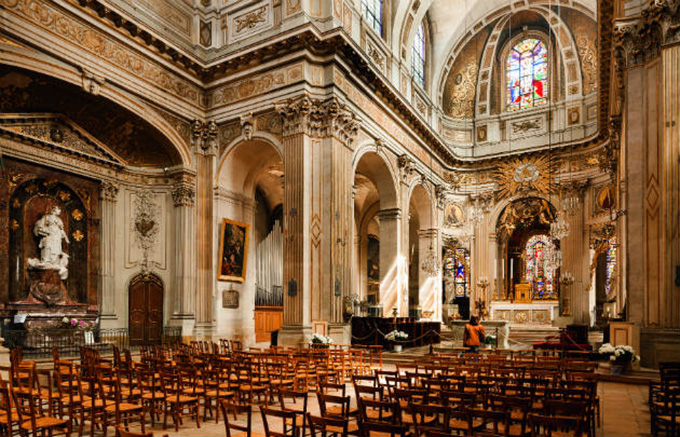
In a letter addressed to the President of the Republic on February 4, 2020, the president of the Les Républicains party, Christian Jacob, renews his request , made in November 2019, for “an act II of secularism with reference to the initiative taken by Jacques Chirac in 2003 when he installed the commission chaired by Bernard Stasi ”.
This commission, it should be remembered, had led to the 2004 law, and the prohibition in schools of signs showing religious affiliation.
It is a question of launching “an in-depth reflection on the implementation of the principle of secularism in French society”, assures Christian Jacob . But where are we really in this complex, even explosive dossier? Secularism is in the grip of a waltz of metaphors (that it is called “firm” or “flexible”, “open” or “uncompromising”) which is more of a posture than a rational and coherent thought.
However, what is deeply underlying is often the loss of sight of the principle of non-contradiction. A historical perspective shows us that the inconsistencies persist, and can even increase in a certain blindness. If it is undoubtedly not easy to reduce them, it is still advisable not to ignore them, at the risk of aggravating the misunderstandings.
Exceptions to the 1905 Law
It is strange that one can envisage going “further” in the separation of the Churches and the State instituted by the law of 1905 , even when religious teachings are dispensed in the public schools of three departments.
When the 1905 law was adopted, Alsace-Lorraine was then annexed to the German Empire. When it became French again in 1918, the Concordat regime adopted in 1802 was maintained there. The Left Bloc government tried in 1924 to remove it, but failed. The situation has not changed for a century, a sign that it is undoubtedly difficult to break out of this historic impasse.
In this regard, we can recall the clerical step of François Hollande in the presidential election. At the end of 2011, he said he wanted to “constitutionalize” the 1905 law of separation of churches and the state. But the strong reactions encountered led him to specify on January 26, 2012 that this measure would apply “subject to the specific rules in Alsace and Moselle”… In any event, this inconsistency shows that logic and the concern for consistency take very much at ease.
Question marks
These observations do not mean, however, that there can be no question of questioning some of the methods of applying secularism. One can think in particular of the application of the law of March 15, 2004 “on the wearing of signs or uniforms showing a religious affiliation in public schools, colleges and high schools” which is in no way compulsory for educational establishments private even under contract.
Certainly, the Debré law guarantees these private establishments under contract their “own character”. But it is affirmed in article 1 of this law that “the establishment, while retaining its own character, must give this teaching while respecting freedom of conscience; all children, regardless of origin, opinion or belief, have access to it ”.
Either the 2004 law is not considered necessary to ensure freedom of conscience in private establishments under contract, and then this law should not logically be considered necessary for public educational establishments. Either the 2004 law is deemed necessary to ensure freedom of conscience in public educational establishments, and it must also be of compulsory application in private educational establishments under contract.
It is all the more urgent to get out of this negation of the principle of non-contradiction when some plan to extend the scope of the 2004 law and to hold an “act II of secularism”. Here again, we must better perceive how the loss of sight of the principle of non-contradiction can generate feelings of injustice, with their possible processions of violence.
Debré law and funding
The implementation of the Debré law of 1959 offers similar aspects. With this law, private schools can conclude contracts with the State: they then undertake to follow the programs in force in public education, in return for which their teachers are paid by the State, and the communities provide financial support for the operation of the establishment.
During the past sixty years, many leftist leaders have declared their intention to repeal it, considering that it indirectly funded certain religious institutions. This was the case of Jean ‑ Luc Mélenchon during the last presidential elections. At the beginning of the campaign, he indicated that he would repeal “the Debré, Rocard and Carle laws which relate to the financing of private schools”. This responds to his personal conviction and his concern to attract voters in his wake of this sensitivity.
At the end of the campaign, when the polls led him to believe that he could become the Head of State, Jean ‑ Luc Mélenchon will only focus on the Carle law, much less decisive than the Debré law. Note that the Carle law focuses on the assumption by municipalities of operating expenses, and stipulates in particular that
“If the commune of residence does not have the reception capacity necessary for the schooling of the pupil, the care of the pupil enrolled in a private elementary school under contract of association outside the commune of residence present always mandatory ”.
This reversal can be easily understood when we know that more than half of the families in fact use the two sectors for their children and that polls regularly indicate that the French are more than three-quarters to decide for the existence of these two sectors, public and private. Again, this is a “historic impasse” from which it appears that there can be no serious question of breaking out.
Author Bio: Claude Lelièvre is Teacher-researcher in the history of education, honorary professor at Paris-Descartes at the University of Paris
